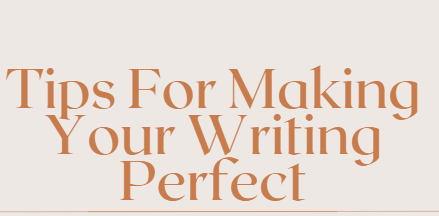Tips For Making Your Writing Perfect
Making your writing perfect is difficult.
If you want to make your writing perfect, do this:
Write, then rewrite, rewrite, rewrite, rewrite, and rewrite. And rewrite. Aargh, it never stops. What could I do to save myself time and energy? Because every time I reread, there’s always something I missed. Is the there is a checklist or guide I can use to help me arrive at where I want my story to be?
Read: How To Write A Great Short Story
Firstly, great writers are actually great rewriters. Even the best of us have to do at least one rewrite. Speaking for myself, I don’t look forward to rewriting because it’s a head cracker; I’d much prefer creating to perfecting.
The joy I derive from a good rewrite is gradually seeing my work come together. It’s the kind of joy that makes all the hard work worth it, but that’s only if I crack it. It’s so hard that I once considered paying a professional to do it for me.
Making your writing perfect is time-consuming. It’s annoying because you have to go over and over the same ‘boring’ words. And still see things you missed, and fear that if you have to go over it, just one more time, you just might lose it.
It could even be more time-consuming than your first write, depending on how bad your first effort was.
Rewriting is what makes the real difference. If you’re lazy about it, honestly, you can stop trying to be a writer. You’re like a sculptor who never finishes the piece because he is tired of chipping at the block and so everything doesn’t get knocked into place.
I prefer to use ironing as a metaphor for writing, because with ironing it’s not about knocking everything into place or carving out something. It’s about making something free of rumples.
In making your writing perfect, you carve out a story, knocking it into shape, and then you ‘iron’ it out. You remove one crease here and another appears over there. You do it again and the same thing happens.
For instance, you might change a word, and when you read the whole paragraph, an echo suddenly appears. In the final rewrite, you settle for the effort that produced the least creases, something that shows the best attempt to make that shirt look ironed.
On my writing list, recently, I sent in a rather confusing piece called, “Zanna”. I was writing in the multiple third for the first time (experimenting with it). The plot was implicit, not clear-cut, because I wrote in three different voices—two voices that did not say things as they were because the first was a child with limited understanding and the second was a priest, a prude who used euphemisms.
After reading the beautiful crits I got, I went back to my studio and chipped away—sorry, went to my ironing table and ironed away. Yes, my critics pointed me to the problems with my writing, but correcting them in such a way that I did not lose my style, my voice, and my POV choice was up to me. After doing that, I decided to draw up a plan or a checklist that I hope will reduce the number of rewrites anyone who reads this will have to make.
I want the things on this list to be at the back of our minds as we write, but only in our rewrites should we be meticulous about them, save one: showing. So don’t think too much about them when you start penning a story. Your first write should always come more from your heart and not your head.
Before I get into the checklist, I want to emphasize the importance of rewriting. It is the difference between frustration and eureka moments. Any writer who doesn’t rewrite, never finishes his work.
So put in lots and lots of time into rewriting or put down your pen. Last week, I got a response from a publisher to whom I sent in two of my short stories. One was rejected, and the other was to undergo further consideration. I looked at the one that was still being considered and saw things wrong with it, things I wanted changed.
I rewrote it—improved it—leaving the storyline unchanged. Now, I plan to write those publishers to ask them to consider the newer version instead, because, frankly; I don’t want the old one published at all. I’d rather have them reject it than have them publish it, especially with my new, improved version in existence. If they publish that old version, I can never publish my new version with any other publisher.
It’s against publishing rules. And I certainly don’t want that. My point is this: rewriting and doing a good job at it saves the pains of reading your published work and thinking I could have done this so much better. If you consider your works your babies, well then, that baby is gone, and you didn’t birth it well.
Most established authors have people who edit their work and help them with their rewrites. Their publishers always provide one for them because if the work has errors, it embarrasses both them and the author. The authors take all the credit, of course. But honestly, the roles of those unknown contributors in tweaking their works were pivotal. Sometimes the difference between success and failure.
Sadly, those of us with no ‘big brother’ publisher are lone wolves, and we must learn to rewrite ourselves. Even if you wish to pay a professional or join a critique group to get some help, your work must be at some level to get the best results.
Final thoughts on Making Your Writings Perfect
So, no matter how good you are, you will still need a second head to assist you, and very good ones are hard to find. Again, in critique groups, you should not expect line-by-line editing, so even when critics say your work is great, you still have to do your own editing.
Charles Opara writes fiction and non-fiction. His short story, The Dream, was recently nominated for the Fiction Desk Newcomer’s Awards.



